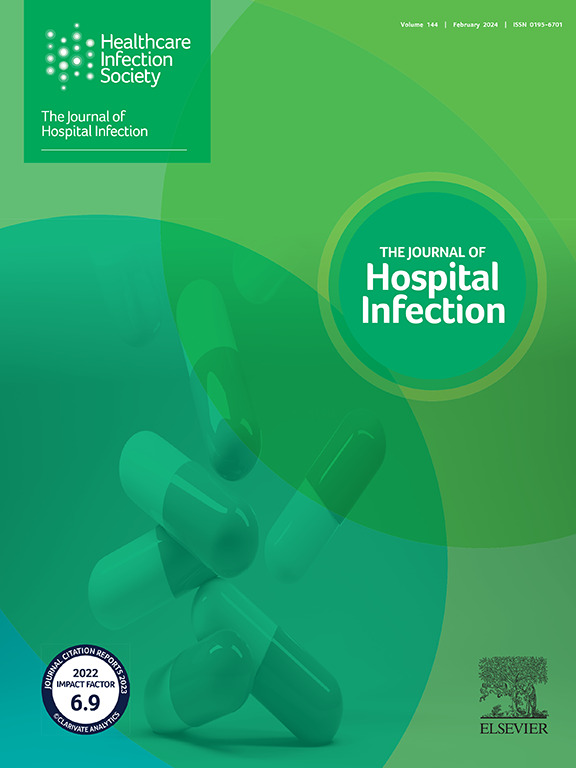一个教育抗菌药物管理计划对抗生素处方的适当性在一个大型大学医院的三个医疗单位的影响:中断时间序列分析。
IF 3.1
3区 医学
Q1 INFECTIOUS DISEASES
引用次数: 0
摘要
背景:抗菌素管理(AMS)计划旨在提高抗生素处方质量,减少抗生素使用,并对抗多重耐药病原体。然而,针对不同临床环境的最佳AMS干预措施仍不清楚,先前的研究主要集中在抗生素的使用而不是处方的适当性。目的:本研究评估以教育为基础的AMS干预对某1500床位大学医院3个医疗单位抗生素处方适宜性的影响。方法:2018年6月至2019年10月,我们在罗马拥有1500个床位的大学医院的三个医疗单位进行了一项回顾性介入、中断时间序列研究,以检验教育计划的效果。干预包括在三个月内(2018年12月至2019年2月)举行的六次教育会议。主要结局是抗生素处方的适宜性,住院生存是次要结局。结果:在评估的609个抗生素处方中,该计划导致一个单位的不适当处方显著且持续减少(水平变化(CL) -18.15%, p结论:相同的教育AMS计划导致三个具有相似结构和组织特征的医疗单位在抗生素适当性方面的不同结果。需要更大规模、更有针对性的高质量AMS介入研究,以更好地了解教育项目对抗生素处方适宜性的影响。本文章由计算机程序翻译,如有差异,请以英文原文为准。
Effect of an educational antimicrobial stewardship programme on antibiotic prescriptions' appropriateness in three medical units of a large university hospital: an interrupted time series analysis
Background
Antimicrobial stewardship (AMS) programmes aim to enhance antibiotic prescription quality, reduce antibiotic use, and combat multi-drug-resistant pathogens. However, the optimal AMS intervention for different clinical settings remains unclear, with previous studies predominantly focusing on antibiotic consumption rather than prescription appropriateness.
Aim
This study aimed to evaluate the impact of an education-based AMS intervention on antibiotic prescription appropriateness in three medical units of a 1500-bed university hospital.
Methods
We conducted a retrospective interventional, interrupted time series study, to test the effect of an educational programme in three medical units of our 1500-bed university hospital in Rome, from June 2018 to October 2019. The intervention comprised six educational meetings held over 3 months (December 2018 to February 2019). The primary outcome was the appropriateness of antibiotic prescriptions, with in-hospital survival as a secondary outcome.
Findings
Of 609 antibiotic prescriptions evaluated, the programme led to a significant and sustained reduction in inappropriate prescriptions in one unit (change in level: -18.15%, P<0.01; change in trend: -3.21%, P=0.01), while it failed to demonstrate a significant reduction in the other two units and globally in the three units.
Conclusion
The same educational AMS programme led to variable results in terms of antibiotic appropriateness in three medical units with similar structural and organizational features. Larger and more tailored high-quality AMS interventional studies are needed to better understand the impact of educational programmes on the appropriateness of antibiotic prescriptions.
求助全文
通过发布文献求助,成功后即可免费获取论文全文。
去求助
来源期刊

Journal of Hospital Infection
医学-传染病学
CiteScore
12.70
自引率
5.80%
发文量
271
审稿时长
19 days
期刊介绍:
The Journal of Hospital Infection is the editorially independent scientific publication of the Healthcare Infection Society. The aim of the Journal is to publish high quality research and information relating to infection prevention and control that is relevant to an international audience.
The Journal welcomes submissions that relate to all aspects of infection prevention and control in healthcare settings. This includes submissions that:
provide new insight into the epidemiology, surveillance, or prevention and control of healthcare-associated infections and antimicrobial resistance in healthcare settings;
provide new insight into cleaning, disinfection and decontamination;
provide new insight into the design of healthcare premises;
describe novel aspects of outbreaks of infection;
throw light on techniques for effective antimicrobial stewardship;
describe novel techniques (laboratory-based or point of care) for the detection of infection or antimicrobial resistance in the healthcare setting, particularly if these can be used to facilitate infection prevention and control;
improve understanding of the motivations of safe healthcare behaviour, or describe techniques for achieving behavioural and cultural change;
improve understanding of the use of IT systems in infection surveillance and prevention and control.
 求助内容:
求助内容: 应助结果提醒方式:
应助结果提醒方式:


